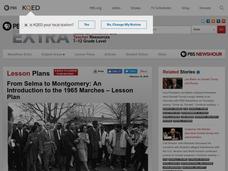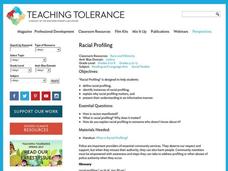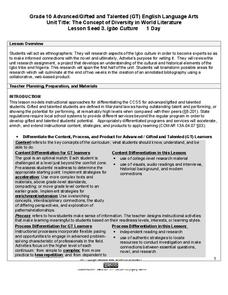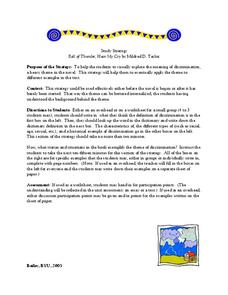J. Paul Getty Trust
Tag: Whose Values
Get young people thinking about their lives and current topics of social justice, advocacy, gender, race, and identity. After examining several works by Barbara Kruger, participants select a tag with one of the questions printed on it,...
Preswick House
Teaching Unit: Invisible Man
Invisible Man is a core text in high school literature classes and one of the most cited works on the AP Literature and Composition exam. Instructors new to using Ralph Ellison's novel and those who have long included it as part of their...
University of Virginia
Analyzing Social Commentary in The Adventures of Huckleberry Finn
The Adventures of Huckleberry Finn continues to be one of the most frequently banned books. The satire and social commentary present challenges when using the book as a core text. Direct readers' attention to how Twain uses plot,...
Smithsonian Institution
African American Pioneers in Aviation
Bessie Coleman. William Powell. Willa Brown. Benjamin O. Davis, Jr. While these names may not be familiar to many Americans, they are African American pioneers in aviation history. Class members have an opportunity to research the...
Anti-Defamation League
10 Ideas for Teaching Black History Month
Celebrate Black History Month with the help of 10 ideas that delve deep into the history, major events, contributions, famous African Americans, and sheds light on how scholars today can take a proactive stance on current civil rights...
National Park Service
Civil War to Civil Rights: From Pea Ridge to Central High
Explore how the Civil War impacted the Civil Rights Movement. Class members complete a series of projects for a unit that uses a layered curriculum approach to learning.
Pacific University Oregon
Civil Rights: US History
To gain an understanding of the Civil Rights Movement of the 1960s, class members investigate the Jim Crow Laws, the Emancipation Proclamation, the 13th, 14th, and 15th Amendments of the US Constitution, and the 1898 Supreme Court case,...
PBS
From Selma to Montgomery: An Introduction to the 1965 Marches
The 1965 Civil Rights marches from Selma to Montgomery and the resulting Voting Rights Act of 1965 are the focus of a social studies lesson. The resource uses film clips to inform viewers not only about the discrimination that gave rise...
Center for History and New Media
Growing Up in a Segregated Society, 1880s–1930s
What did segregation look like in the beginning of the 20th century? Middle and high schoolers view images of segregated areas, read passages by Booker T. Washington and W.E.B. DuBois, and come to conclusions about how the influence of...
Center for History and New Media
The Impact of the Jim Crow Era on Education, 1877–1930s
Even though American slaves were officially emancipated in 1865, the effects of slavery perpetuated throughout the 19th and 20th centuries. Middle and high schoolers learn about the ways that discrimination and the Jim Crow laws...
BPE
Teacher Guide for Faster Passage: "Sympathy" and "Caged Bird" Poetry
Prepare class members for formative assessments of student thinking in reading (FAST-R) with a resource that compares Paul Laurence Dunbar's "Sympathy" and Maya Angelou's "Caged Bird." Readers respond to 10 multiple choice questions and...
Museum of Tolerance
Improving My Community Through Social Action
Action is the heart of change. Encourage class members to not only identify critical social justice issues in their school or community but to take action as well. As individuals or as groups, they research a situation, develop a...
Museum of Tolerance
Essential Vocabulary and Concepts
Genocide. Scapegoat. Propaganda. Words are powerful. Words carry the weight of history. To prepare for a visit to The Museum of Tolerance, class members consider the weight of meaning in words related to intolerance.
Museum of Tolerance
Why is This True?
Are wages based on race? On gender? Class members research wages for workers according to race and gender, create graphs and charts of their data, and compute differences by percentages. They then share their findings with adults and...
Museum of Tolerance
The Price of Personal Responsibility
A reading of Patrick Henry's "Speech in the Virginia Convention," Henry David Thoreau's "Civil Disobedience," and Rev. Martin Luther King, Jr.'s "Letter from Birmingham Jail" launch a discussion about the price one is willing to pay to...
Curated OER
Prejudice and Discrimination
How do we break the habit of prejudice? The activities in this packet are designed to promote awareness, harmony, and acceptance. Participants identify their stereotypic beliefs, attitudes, and behaviors, reflect to discover the sources...
Teaching Tolerance
Racial Profiling
Racial Profiling. Class members chart what they know and what they want to know about this hot-button topic.
Maryland Department of Education
The Concept of Diversity in World Literature Lesson 4: Proverbs
"Eneke the bird says since men have learnt to shoot without missing, he has learnt to fly without perching." As part of their study of Things Fall Apart, class members read Paul Hernadi and Francis Steen's essay, "The Tropical Landscapes...
Maryland Department of Education
The Concept of Diversity in World Literature Lesson 3: Igbo Culture
What cultural concepts must readers understand in order to connect to Things Fall Apart? As part of their study of Chinua Achebe’s novel, class members research Nigeria and the Igbo culture to create a collaborative, web-based, annotated...
Maryland Department of Education
The Concept of Diversity in World Literature Lesson 1: Unit Introduction
To launch a unit study of the concept of diversity in World Literature, class members compare Chinua Achebe's essay, "An Image of Africa: Racism in Conrad's Heart of Darkness" and Richard Rodriguez's essay, "The Chinese in All of Us: A...
Core Knowledge Foundation
Genetics and the Master Race
How did the beginnings of genetic research influence the Nazi party? A thorough, engaging unit incorporates the work of Gregor Mendel, the study of inherited traits, and the use of racism and discrimination during the Holocaust.
City University of New York
African Americans and the Populist Movement
Why did the Populist Party fail to ally itself with African American farmers? To answer this essential question, class members investigate the Populist Era (188-1900) and read an article written by Tom Watson, a Populist leader.
Alabama Department of Archives and History
Two Different African-American Visions: W.E.B. Du Bois and Booker T. Washington
The strategies civil rights activists Booker T. Washington and W.E.B. Du Bois proposed for blacks to achieve racial progress is the focus of an activity in which class groups identify the strategies as well as the benefits and drawbacks...
Novelinks
Roll of Thunder, Hear My Cry: Study Strategy
Readers of Roll of Thunder, Hear My Cry expand their understanding of discrimination by using the provided graphic organizer to record the definition of the word, characteristics of and different types of discrimination, as well as...

























